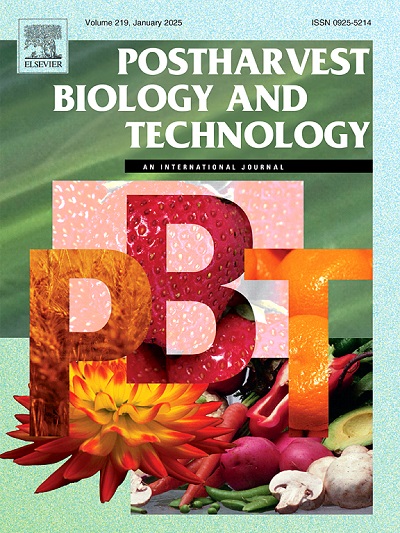The role of linalool in managing Alternaria alternata infection and delaying black mold rot in goji berry
IF 6.4
1区 农林科学
Q1 AGRONOMY
引用次数: 0
Abstract
Alternaria alternata, a common fungal pathogen causes black mold in postharvest goji fruit. To explore the in vitro and in vivo impacts of linalool on the fungal infection, we treated A. alternata and infected goji fruit with varying linalool concentrations (0, 0.15, 0.45, and 1.35 mL L−1). Linalool repressed hypha growth, spore yield and germination, and germ tube length of A. alternata. Furthermore, we observed abnormal spore and mycelium morphology in the treated samples using optical, scanning electron, and transmission electron microscopy. Linalool reduced lesion diameter and disease incidence in goji fruit. Moreover, transcriptomic analysis of pathogen revealed that linalool inhibited nitrogen metabolism, altered chitin and β-1,3-glucan metabolisms, downregulated the key gene expression related to ergosterol synthesis and sulfur and glutathione metabolisms, regulated the enzymatic antioxidant system, and impacted the proportion of unsaturated fatty acids. Furthermore, linalool damaged the fungal cell wall integrity by inducing alkaline phosphatase and chitinase activities and β-1,3-glucan content and repressing β-1,3-glucanase and chitin synthase activities and chitin levels. Linalool elevated superoxide dismutase and catalase activities and declined peroxidase and glutathione reductase activities and glutathione content in A. alternata, leading to increased H2O2 levels and ROS stress. Our data exhibited the promising antifungal effects of linalool with a future application in management of the postharvest rot of goji fruit.
芳樟醇在控制枸杞交替孢霉感染和延缓黑霉菌腐烂方面的作用
交替丝核菌是一种常见的真菌病原体,会导致采后枸杞果实发生黑霉病。为了探究芳樟醇在体外和体内对真菌感染的影响,我们用不同浓度的芳樟醇(0、0.15、0.45 和 1.35 mL L-1)处理交替孢霉和受感染的枸杞果实。芳樟醇抑制了交替穗霉的菌丝生长、孢子产量和萌发以及芽管长度。此外,我们还使用光学、扫描电子和透射电子显微镜观察了处理过的样品中异常的孢子和菌丝形态。芳樟醇降低了枸杞果实的病斑直径和发病率。此外,病原菌转录组分析表明,芳樟醇抑制了氮代谢,改变了几丁质和β-1,3-葡聚糖代谢,下调了麦角甾醇合成、硫和谷胱甘肽代谢相关的关键基因表达,调节了酶抗氧化系统,并影响了不饱和脂肪酸的比例。此外,芳樟醇还通过诱导碱性磷酸酶和几丁质酶活性及β-1,3-葡聚糖含量,抑制β-1,3-葡聚糖酶和几丁质合成酶活性及几丁质含量,破坏真菌细胞壁的完整性。芳樟醇能提高交替蚁的超氧化物歧化酶和过氧化氢酶活性,降低过氧化物酶和谷胱甘肽还原酶活性以及谷胱甘肽含量,从而导致 H2O2 水平升高和 ROS 压力增加。我们的数据表明芳樟醇具有良好的抗真菌效果,未来可用于枸杞果实采后腐烂病的防治。
本文章由计算机程序翻译,如有差异,请以英文原文为准。
求助全文
约1分钟内获得全文
求助全文
来源期刊

Postharvest Biology and Technology
农林科学-农艺学
CiteScore
12.00
自引率
11.40%
发文量
309
审稿时长
38 days
期刊介绍:
The journal is devoted exclusively to the publication of original papers, review articles and frontiers articles on biological and technological postharvest research. This includes the areas of postharvest storage, treatments and underpinning mechanisms, quality evaluation, packaging, handling and distribution of fresh horticultural crops including fruit, vegetables, flowers and nuts, but excluding grains, seeds and forages.
Papers reporting novel insights from fundamental and interdisciplinary research will be particularly encouraged. These disciplines include systems biology, bioinformatics, entomology, plant physiology, plant pathology, (bio)chemistry, engineering, modelling, and technologies for nondestructive testing.
Manuscripts on fresh food crops that will be further processed after postharvest storage, or on food processes beyond refrigeration, packaging and minimal processing will not be considered.
文献相关原料
公司名称
产品信息
上海源叶
Linalool
 求助内容:
求助内容: 应助结果提醒方式:
应助结果提醒方式:


